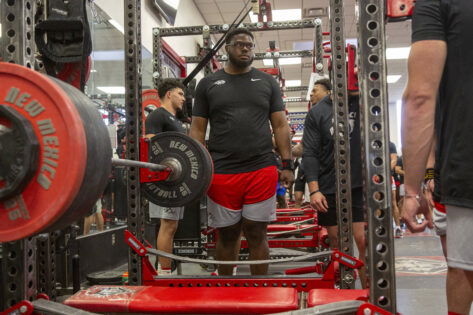Every college football fan has lived through the anxiety of waiting for a call, an eligibility ruling, a transfer waiver, or something that holds the fate of a favorite player or team in the balance. But rarely do we see so many athletes in high-profile programs, all at once, left hanging in career limbo. If you’ve been following the DJ Wingfield eligibility drama at USC, buckle up; he’s about to get company, and the stakes just got a whole lot bigger.
We all know DJ Wingfield’s story by now. He is a talented offensive lineman who’s taken the fight to federal court after the NCAA denied his last shot to suit up for the Trojans. But imagine having your dream season in reach, only to discover you’re not alone in your struggle. Wingfield, it turns out, isn’t the only college athlete fighting for that one last season. College football’s eligibility limbo has a waiting room, and this fall, it’s getting crowded.
The courtroom just got a lot more interesting with Judge Selna’s announcement. Now, not one, not two, but three athlete lawsuits challenging NCAA eligibility rules will be heard together. As tweeted by sports law expert Sam C. Ehrlich: “As Judge Selna notes in the order, all three eligibility rule lawsuits before him — Jagger Giles v. NCAA, Kaedin Robinson v. NCAA, and now DJ Wingfield v. NCAA—will be heard together on August 18 at 1:30 PM PT. Should be an interesting hearing.”
That’s right, Jagger Giles and Kaedin Robinson will have their cases argued alongside Wingfield’s. All three athletes, each from a different background but sharing the same late-summer uncertainty: will the court step in and let them suit up for one more college season?
As Judge Selna notes in the order, all three eligibility rule lawsuits before him — Jagger Giles v. NCAA, Kaedin Robinson v. NCAA, and now DJ Wingfield v. NCAA — will be heard together on August 18 at 1:30 PM PT.
Should be an interesting hearing.
— Sam C. Ehrlich (@samcehrlich) August 4, 2025
Jagger Giles, a linebacker, began his career at Cal State San Marcos but didn’t play college sports there, then went on to Grossmont College (JUCO) for two years before starring at Idaho State for the 2023 and 2024 seasons. After earning a transfer to the University of San Diego, Giles discovered he was deemed ineligible under the NCAA’s five-year rule, which counted his time at junior college toward the limit, even though he wasn’t informed this would be the case. Frustrated by what he calls an unfair and confusing policy, Giles is now suing in federal court, alleging the NCAA’s rule unlawfully restricts transfers like his and violates antitrust laws.
Kaedin Robinson’s journey runs a similar path, but as a skilled wide receiver. Robinson started at ASA College Brooklyn (JUCO) before a brief time at Central Florida and a highly productive stint at Appalachian State. He intended to finish his career at UCLA and accepted an NIL deal reportedly worth $450,000. However, the NCAA denied his waiver for a final year, stating his earlier JUCO years and COVID-related interruptions still counted. Robinson’s lawsuit, filed in California, claims the five-year rule’s current enforcement is anticompetitive, prejudices junior college athletes, and directly costs him both monetarily and professionally by denying him a marquee season at UCLA.
Just think about what’s at stake here. From hundreds of thousands in NIL deals to the dream of playing at the highest level to simply finishing what they started. These cases echo the struggles faced by players like Wisconsin’s Nyzier Fourqurean, who’s also fighting the NCAA’s “five-year rule” after transfers, pandemic years, and personal hardship cluttered his eligibility clock. Each lawsuit adds more fuel to the bonfire of questions about whether NCAA rules, written in a different era, can keep pace with the realities of the transfer portal, pandemic disruptions, and modern athlete rights.
Waiting game on the West Coast
If you’re feeling deja vu watching DJ Wingfield’s journey, you’re not alone. The USC offensive lineman, after transferring in from Purdue with a starting pedigree and a $210,000 NIL opportunity awaiting, remains caught in the NCAA’s eligibility storm. A new judge denied his temporary restraining order, meaning the NCAA must now show cause on Aug. 18 for why Wingfield shouldn’t suit up for the Trojans this fall.
Through it all, Lincoln Riley hasn’t hidden his frustration or support. A few days ago, the head coach admitted, “He’s not doing very good. You know, I’m not supposed to comment on these things, but what’s happening with that, and not just DJ, across the country, just isn’t right. I’ve never seen anything like it in all my years as a coach, and I’ve been a part of a lot of different, unique situations that come up, and this one’s a new one.” Riley recognizes the mental weight Wingfield carries and, like any coach, wants clarity soon. It’s saddening how young athletes who should be playing their hearts out right now have to go through tough legal proceedings because of circumstances that weren’t under their control.
Behind the legal tangle is a player who climbed the college football ranks the hard way: two years at El Camino Junior College, time lost to caring for his mother in the pandemic, a torn ACL at New Mexico, then finally a breakout year at Purdue before this final act at USC. Wingfield’s case, hinging on how (and whether) JUCO years and pandemic interruptions should count against the five-year clock, now sits at the intersection of fairness, eligibility, and the NCAA’s willingness to adapt. For now, Trojan fans and Wingfield himself can only wait, hope, and prepare for a potentially game-changing decision later this month.
The post Two More College Athletes Join DJ Wingfield in Career Limbo After New Hearing Date Announced appeared first on EssentiallySports.
